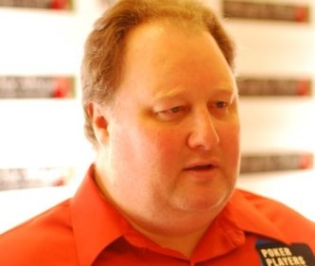
2004 World Series of Poker Main Event champion Greg Raymer was in a Virginia courtroom on Tuesday, testifying in what would eventually be a failed attempt to overturn laws in Portsmouth, VA, and across the state that make poker “halls” illegal.
According to an article by Dave Forster in The Virginian-Pilot, the lawsuit concerned Charles Daniels, a businessman who operated the “Poker Palace,” a poker hall in Portsmouth. That business, and approximately a half-dozen others, operated from 2006 to 2010 and Daniels’ operation donated proceeds from its poker tournaments and cash games to several charitable causes. Forster reports that Daniels’ business donated more than $700,000 to charities (approximately 74% of its revenues) to such organizations as the March of Dimes, the Chesapeake Sheriff’s Office Charities and the Portsmouth Catholic Regional School.
Daniels’ operation was closed in 2010 by Portsmouth’s Commonwealth Attorney Earle C. Mobley, even though Mobley had allowed the businesses to operate for half a decade with no interference because Mobley had problems with the vagaries of the state’s gambling laws. The change came in 2010, Forster writes, because Mobley didn’t want the city of Portsmouth to become a “gambling center.”
In front of Judge Thomas Shadrick in Portsmouth’s Circuit Court on Tuesday, the former World Champion was on hand to help to prove Daniels’ case. The Poker Players Alliance, of which Raymer is a member of the Board of Directors, was enlisted by Daniels to help out with the court presentation. As such, Raymer appeared in front of Judge Shadrick Tuesday to demonstrate the skills required to be successful at the game of poker.
Over a fifteen minute presentation, Raymer demonstrated that poker – unlike those games of chance that gambling laws prohibit – has a unique skill set that separates it from other games. Raymer also pointed out to Judge Shadrick how a player can improve their odds of winning through mathematical calculation, deducing an opposing player’s strategy and reading a player, or “tells.”
Raymer’s testimony was an important part of Daniels’ case as his attorneys argued that poker is predominantly a game of skill and, as such, not covered by Virginia law. The second arm of Daniels’ case was that the state laws regarding “gambling” could be placed on many different forms of commerce, including investing in farm commodity futures.
Robert Musick, the attorney who represented Mobley because he was named as a defendant in the case, stated that Daniels knew he was running an illegal business because he asked Mobley for clarification of the law. Musick also pointed out the Daniels, knowing the operation wasn’t legal, wouldn’t have been lobbying to change the laws of the state to make his business legal.
In the end, unfortunately, Judge Shadrick was unmoved by the testimony from Daniels’ team and found in favor of Mobley. According to Forster’s article, Judge Shadrick “conceded that poker involves skill, but the evidence also showed that, while better players will win more over time, the outcome of each hand is still uncertain.” Judge Shadrick, in responding to Daniels’ claim that the laws in Virginia regarding gambling were too vague, disagreed with the assertion, basically stating that anyone with normal intelligence would be able to understand the laws.
Laws in the state of Virginia define illegal gambling as “the wagering of something of value for a chance to win something of value in a contest, the outcome of which is uncertain or a matter of chance.” Forster points out in his article that there are several exemptions under the Virginia law, most notably to allow for bingo parlors (one of which Daniels also owns).
Comments on PilotOnline.com, the website for the Virginian-Pilot, seem to be siding with Daniels in his case. “In a free society, one should be able to make choices how to spend their own money,” poster ‘winn17433’ writes. “So people will continue to have backroom poker or go to Dover where they can legally play,” poster ‘vabeach757’ says. “So Delaware gets the $$$ that Virginia should be getting…not too bright, Virginia!”
What the future of this particular case may be has not been written yet. According to Forster, Daniels has not yet decided whether to appeal the case to a higher court.























